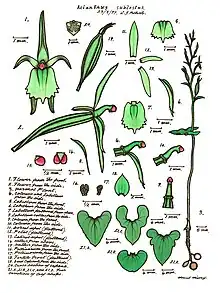| Acianthus amplexicaulis | |
|---|---|
 | |
| Illustration by Lewis Roberts | |
| Scientific classification | |
| Kingdom: | Plantae |
| Clade: | Tracheophytes |
| Clade: | Angiosperms |
| Clade: | Monocots |
| Order: | Asparagales |
| Family: | Orchidaceae |
| Subfamily: | Orchidoideae |
| Tribe: | Diurideae |
| Genus: | Acianthus |
| Species: | A. amplexicaulis |
| Binomial name | |
| Acianthus amplexicaulis | |
| Synonyms[1] | |
| |
Acianthus amplexicaulis, is a species of flowering plant in the orchid family Orchidaceae and is native to eastern Australia and New Caledonia. The Australian Plant Census accepts the name Stigmotodactylus amplexicaulis (F.M.Bailey) S.P.Lyon, M.A.Clem. & D.L.Jones[2] and the National Herbarium of New South Wales Acianthella amplexicaulis (F.M.Bailey) D.L.Jones and M.A.Clem.[3] It is a terrestrial herb with a single leaf and between 2 and 20 translucent green flowers.
Description
Acianthus amplexicaulis is a terrestrial herb with a single leaf 20–25 mm (0.79–0.98 in) long and 15–25 mm (0.59–0.98 in) wide, usually with deep lobes on the edges. Between 2 and 20 translucent green flowers are borne on a raceme 50–90 mm (2.0–3.5 in) long. The dorsal sepal is linear, about 3 mm (0.12 in) long and 0.5 mm (0.020 in), and the lateral sepals are linear, spread apart from each other, curved downwards, about 3 mm (0.12 in) long and 0.5 mm (0.020 in) wide. The petals are spread apart or turned down, about 2 mm (0.079 in) long and 0.5 mm (0.020 in) wide. The labellum is broadly oblong, about 2.5 mm (0.098 in) wide and 2 mm (0.079 in) wide with coarse teeth near the end. There is a fleshy green callus near the base of the labellum and the pollinium is burgundy-coloured.[3][4]
Taxonomy
The species was first described in 1891 by Frederick Manson Bailey who gave it the name Microstylis amplexicaulis in the "Botany Bulletin" of the "Department of Agriculture, Queensland" from specimens collected in the "scrubs of Eudlo Creek in 1891".[5] In 1903, Robert Allen Rolfe transferred the species to Acianthus as A. amplexicaulis in The Orchid Review, a name accepted by Plants of the World Online and in New Caledonia.[1][6] In 2004, David Jones and Mark Clements transferred the species from M. amplexicaulis to Acianthella as A. amplexicaulis in The Orchadian, and the name is accepted by National Herbarium of New South Wales.[3] In 2017, Stephanie Pimm Lyon, Mark Clements and David Jones transferred the species to the genus Stigmatodactylus as S. amplexicaulis, a name accepted by the Australian Plant Census.[2]
The specific epithet (amplexicaulis) means "stem-clasping".[7]
Distribution
Acianthus amplexicaulis grows in moist coastal scrub in littoral rainforest from north-eastern Queensland to Wyrrabalong National Park in New South Wales, and in New Caledonia.[1][3][6]
References
- 1 2 3 4 "Acianthus amplexicaulis (F.M.Bailey) Rolfe". Plants of the World Online. Royal Botanic Gardens, Kew. Retrieved 6 December 2023.
- 1 2 "Stigmotodactylus amplexicaulis". Australian Plant Census. Retrieved 6 December 2021.
- 1 2 3 4 Jones, David L. "Acianthella amplexicaulis". Royal Botanic Garden, Sydney. Retrieved 6 December 2023.
- ↑ Jones, David L. (2006). A complete guide to native orchids of Australia including the island territories. Frenchs Forest, N.S.W.: New Holland. p. 161. ISBN 1-877069-12-4.
- ↑ "Microstylis amplexicaulis". APNI. Retrieved 6 December 2023.
- 1 2 "Acianthus amplexicaulis". Endemia.nc. Retrieved 7 December 2023.
- ↑ Sharr, Francis Aubi; George, Alex (2019). Western Australian Plant Names and Their Meanings (3rd ed.). Kardinya, WA: Four Gables Press. p. 131. ISBN 9780958034180.